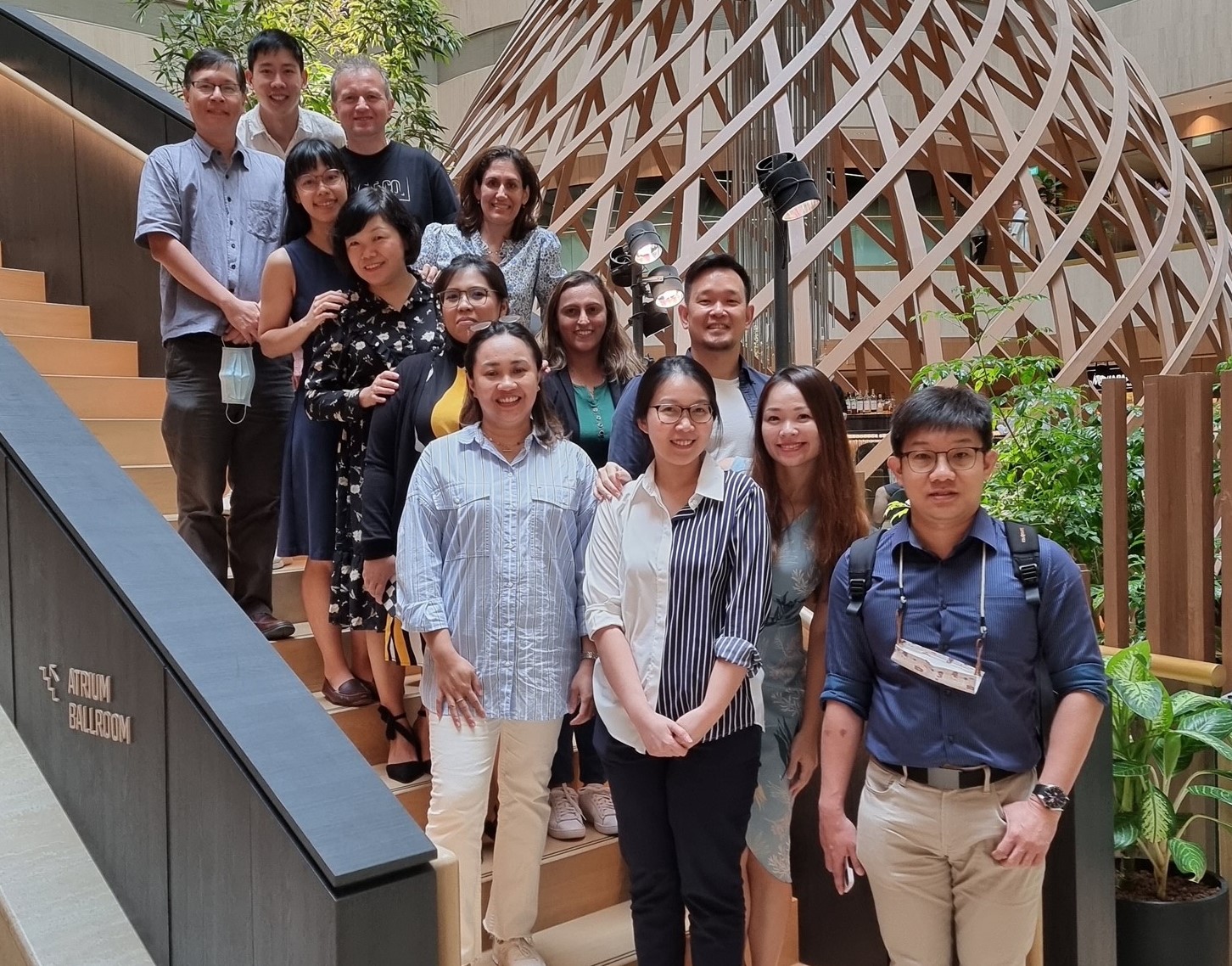The NUH HIV Research Programme is involved in a number of operational, clinical and behavioural research projects. Working in partnership with external institutions such as the National University of Singapore, the Institute of Infectious Diseases and Epidemiology at Tan Tock Seng Hospital and internally with the NUH Division of Infectious Diseases, all the research projects are focused on benefiting and improving the quality of care for PLHA in Singapore and the Asia Pacific Region.
To date, the research has helped bring about a re-evaluation of and significant improvements in HIV screening methods and treatment regimes. Notable research projects conducted since 2014 include:
1. Smibert OC, Trubiano JA, Cross GB, Hoy JF. Mycobacterium avium complex infection and immune reconstitution inflammatory syndrome remain a challenge in the era of effective antiretroviral therapy. AIDS Res Hum Retroviruses. December 2017, 33(12): 1202-1204. https://doi.org/10.1089/aid.2017.0030
2. TanXQ, Goh WP, Venkatachalam I, Goh D, Sridhar R, Chan HW, Archuleta S. Evaluation of a HIV voluntary opt-out screening program in a Singapore hospital. PLoS One. 2015 Jan 22;10(1):e0116987. doi: 10.1371/journal.pone.0116987. eCollection 2015.
3. Kapoor R, Martinez-Vega R, DongD, Tan SY, Leo YS, Lee CC, Sung C, Ng OT, Archuleta S, Teo YY. Reducing hypersensitivity reactions with HLA-B*5701 genotyping before abacavir prescription: clinically useful but is it cost-effective in Singapore? Pharmacogenet Genomics. 2015 Feb;25(2):60-72.
4. Lee CK,Tang JWT,Chiu L,Loh TP,Olszyna D, Chew N, Archuleta S, Koay ESC.Epidemiology of GB virus type C among HIV-infected patients in Singapore. J Med Virol. 2014 May;86(5):737-44.
Additional:
1. Dr Dariusz P Olszyna, Tiane Le, Prof Sophia Archuleta, (192) EVOLUTION FROM AN HIV PREP CLINIC TO A COMPREHENSIVE SEXUAL HEALTH SERVICE IN A TERTIARY UNIVERSITY HOSPITAL IN SOUTHEAST ASIA, The Journal of Sexual Medicine, Volume 21, Issue Supplement_4, May 2024
2. Koh MCY, Ngiam JN, Yong J, Tambyah PA, Archuleta S. The role of an artificial intelligence model in antiretroviral therapy counselling and advice for people living with HIV. HIV Med. 2024 Apr;25(4):504-508.
3. Choy CY, Wong CS, Kumar PA, Olszyna DP, Teh YE, Chien MFJ, Kurup A, Koh YL, Ho LP, Law HL, Chua NGS, Yong HYJ, Archuleta S. Recommendations for the use of antiretroviral therapy in adults living with human immunodeficiency virus in Singapore. Singapore Med J. 2024 May 1;65(5):259-273.
4. Choy CY, Wong CS, Kumar PA, Lin RTP, Low C, Toh MPHS, Huang F, Olszyna DP, Teh YE, Jaime Chien MF, Archuleta S. National HIV programme testing recommendations. Singapore Med J. 2023 May 19.
Ng DH, Beh DL, Sutjipto S, Archuleta S, Wong CS. The Greying Pandemic: Implications of Ageing Human Immunodeficiency Virus-Positive Population in Singapore. Ann Acad Med Singap. 2019 Dec;48(12):393-395.
5. Hung CC, Phanuphak N, Wong CS, Olszyna DP, Kim TH. Same-day and rapid initiation of antiretroviral therapy in people living with HIV in Asia. How far have we come? HIV Med. 2022 Oct;23 Suppl 4:3-14.
6. Choy CY, Wong CS, Kumar PA, Yeo B, Banerjee S, Leow Y, Olszyna DP, Tan KK, Tan RKJ, Ti J, Chan R, Le D, Kwok C, Archuleta S. Guidance for the prescription of human immunodeficiency virus pre-exposure prophylaxis in Singapore. Singapore Med J. 2022 Apr 3;65(5):308–11.
7. Teng VYM, Chua YT, Lai EEN, Mukherjee S, Michaels J, Wong CS, Shen L, Leo YS, Young B, Archuleta S, Ong CWM. Lack of latent tuberculosis (TB) screening and delay in anti-retroviral therapy initiation in HIV-TB co-infection: an 11-year study in an intermediate TB-burden country. Int J Infect Dis. 2021 Dec;113:178-183.
8. Brenda Mae Salada, Siew Fai Lee, Clarisse Chen, James S Molton, Sophia Archuleta, Jessica Michaels, 1907. Barriers at the Last Hurdle: Implementing Advance Care Planning for People Living with HIV, Open Forum Infectious Diseases, Volume 5, Issue suppl_1, November 2018, Page S548,
9. Tay, Woo, Chio, Martin, Ho, Benjamin, Archuleta, Sophia, Olszyna, Dariusz. (2023). Four cases of HIV infection in men taking pre-exposure prophylaxis in Singapore. Annals of the Academy of Medicine, Singapore. 52. 704-706. 10.47102/annals-acadmedsg.2023228.
The Multi-Disciplinary Infectious Disease Clinic (MIDC) has been providing treatment and support to people living with HIV/AIDS and their loved ones through the outpatient and inpatient services since 2010. In addition to the MIDC, an integrated sexual health clinic BePrEP was introduced in 2016 to provide education and prevention on HIV, Post-Exposure Prophylaxis (PEP), Pre-Exposure Prophylaxis (PrEP) and other sexually transmitted infections (STIs) related health concerns.
The HIV Programme four prongs approach of Treatment, Prevention, Education and Research work towards the worldwide 90-90-90 target by 2030, in which 90% of all people living with HIV will know their HIV status, 90% of all people with diagnosed HIV infection will receive treatment and 90% of all people receiving treatment will have undetectable viral loads. These approaches are based on a pro-active and holistic approach to HIV/AIDS and are provided in a collaborative, empowering, and non-discriminatory manner.



















